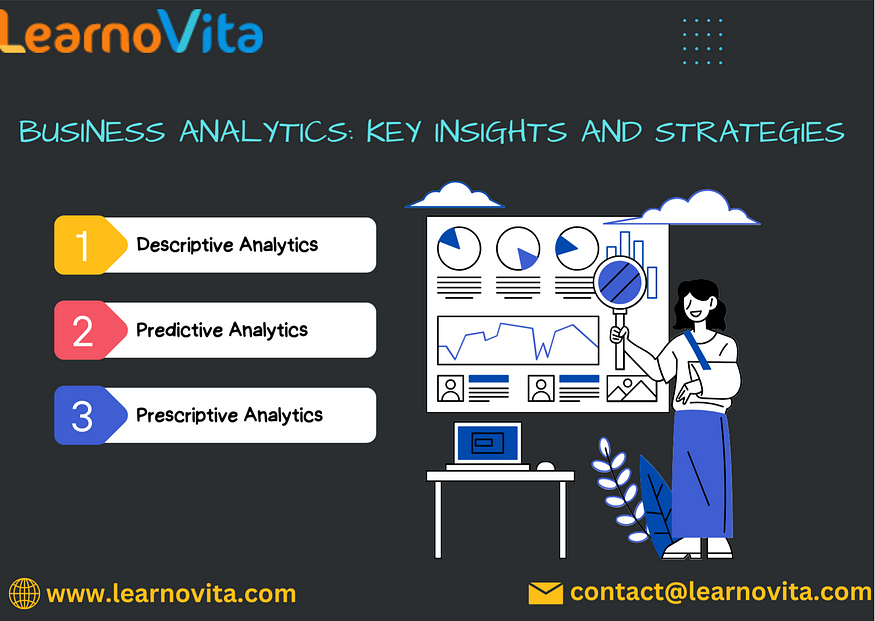A Detailed Review of Business Analytics Methodologies
In a data-driven world, organizations are increasingly turning to business analytics to enhance decision-making, improve operations, and gain competitive advantages. Understanding the various methodologies in business analytics is crucial for leveraging data effectively. This blog will provide a detailed review of the key methodologies used in business analytics, their applications, benefits, and challenges.
If you want to excel in this career path, then it is recommended that you upgrade your skills and knowledge regularly with the latest Business Analytics training in Bangalore.

What are Business Analytics Methodologies?
Business analytics methodologies refer to the structured approaches used to analyze data and derive insights. These methodologies encompass a range of techniques, from basic statistical analysis to advanced machine learning models. By employing these methodologies, organizations can transform raw data into actionable intelligence.
Key Business Analytics Methodologies
-
Descriptive Analytics:
- Definition: Descriptive analytics involves summarizing historical data to understand past performance and trends.
- Techniques: Common techniques include data visualization, reporting, and basic statistical analysis.
- Applications: Organizations use descriptive analytics to monitor key performance indicators (KPIs), identify trends, and generate reports for stakeholders.
-
Predictive Analytics:
- Definition: Predictive analytics uses historical data and statistical algorithms to forecast future outcomes.
- Techniques: Techniques include regression analysis, time series analysis, and machine learning algorithms.
- Applications: Businesses apply predictive analytics for demand forecasting, customer behavior analysis, and risk assessment.
-
Prescriptive Analytics:
- Definition: Prescriptive analytics provides recommendations for actions based on data analysis.
- Techniques: This methodology utilizes optimization algorithms, simulation, and decision analysis.
- Applications: Organizations use prescriptive analytics for resource allocation, supply chain optimization, and strategic planning.
-
Diagnostic Analytics:
- Definition: Diagnostic analytics focuses on understanding the reasons behind past outcomes.
- Techniques: Techniques include root cause analysis and correlation analysis.
- Applications: Businesses use diagnostic analytics to investigate performance issues and identify areas for improvement.
-
Cognitive Analytics:
- Definition: Cognitive analytics integrates artificial intelligence and machine learning to simulate human thought processes.
- Techniques: Techniques include natural language processing and neural networks.
- Applications: Organizations use cognitive analytics for customer service automation, sentiment analysis, and personalized marketing.
Benefits of Business Analytics Methodologies
Enhanced Decision-Making
By employing various methodologies, organizations can make informed decisions based on data rather than intuition. This empirical approach improves decision accuracy.
Improved Operational Efficiency
Analyzing data through these methodologies enables businesses to identify inefficiencies and streamline processes, leading to reduced costs and increased productivity.
Deeper Customer Insights
Business analytics methodologies provide valuable insights into customer preferences and behaviors, allowing organizations to tailor their products and marketing strategies effectively.
Competitive Advantage
Organizations that effectively leverage these methodologies can respond quickly to market changes, making data-driven decisions that provide a competitive edge.
With the aid of Best Online Training & Placement programs, which offer comprehensive training and job placement support to anyone looking to develop their talents, it’s easier to learn this tool and advance your career.

Challenges in Implementing Business Analytics Methodologies
While the benefits are significant, organizations may face challenges when implementing business analytics methodologies:
- Data Quality: Ensuring the accuracy and completeness of data is crucial for reliable insights.
- Skill Gap: There may be a shortage of professionals with the necessary analytical skills to implement advanced methodologies.
- Integration Complexity: Combining data from various sources can be complex and time-consuming.
Best Practices for Implementing Business Analytics Methodologies
1. Define Clear Objectives
Establish clear goals before initiating any analytics project. Determine the specific questions you want to answer or problems you aim to solve.
2. Choose Appropriate Methodologies
Select methodologies that align with your organization’s goals and the nature of the data available. Each methodology has its strengths and best use cases.
3. Foster a Data-Driven Culture
Encourage a culture that values data-driven decision-making. Provide training and resources for employees to understand how to leverage analytics methodologies.
4. Ensure Data Quality
Implement processes to regularly clean and validate data to ensure accurate analysis and reporting.
5. Monitor and Adapt
Regularly review your analytics strategies and be prepared to adapt to new trends, technologies, and market conditions.
Conclusion
A detailed review of business analytics methodologies reveals the importance of structured approaches in leveraging data for strategic decision-making. By understanding and applying these methodologies, organizations can enhance their decision-making processes, improve operational efficiency, and gain valuable insights into customer behavior.
As you explore the world of business analytics, remember that the goal is to transform data into actionable insights. With the right methodologies and strategies, organizations can unlock the full potential of their data and drive sustainable growth.
We are excited to announce the **launch of the Sharkbow Marketplace!** 🎉 Now you can:
- 🛍️ List and sell your products – Open your own store easily.
- 📦 Manage orders effortlessly – Track sales and communicate with buyers.
- 🚀 Reach thousands of buyers – Expand your business with ease.
Start selling today and grow your online business on Sharkbow! 🛒
Open Your Store 🚀 ✖🚀 What Can You Do on Sharkbow?
Sharkbow.com gives you endless possibilities! Explore these powerful features and start creating today:
- 📝 Create Posts – Share your thoughts with the world.
- 🎬 Create Reels – Short videos that capture big moments.
- 📺 Create Watch Videos – Upload long-form content for your audience.
- 📝 Write Blogs – Share stories, insights, and experiences.
- 🛍️ Sell Products – Launch and manage your online store.
- 📣 Create Pages – Build your brand, business, or project.
- 🎉 Create Events – Plan and promote your upcoming events.
- 👥 Create Groups – Connect and build communities.
- ⏳ Create Stories – Share 24-hour disappearing updates.
Join Sharkbow today and make the most out of these features! 🚀
Start Creating Now 🚀- Art
- Causes
- Crafts
- Dance
- Drinks
- Film
- Fitness
- Food
- Games
- Gardening
- Health
- Home
- Literature
- Music
- Networking
- Other
- Party
- Religion
- Shopping
- Sports
- Theater
- Wellness
